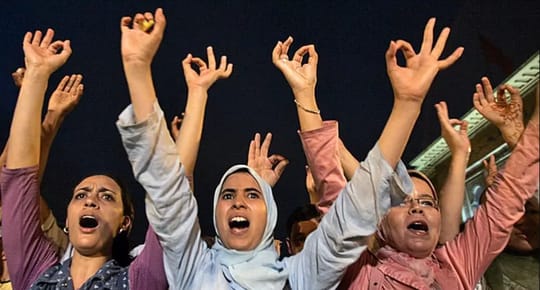This 2014 day of democracy brings to the fore a great question – that begs an answer – facing the youth of the world and especially in countries in the Middle East and North Africa. How can widespread and apparently uncompromising socio-economic despondency be addressed in a sustainable manner?
The answer lies is an applied action – through participatory democracy that engages individuals and communities in dialog and consensus-building, with the goal of identifying their development challenges and opportunities and creating a plan for shared action to achieve priority projects.
In Morocco, where the situation of its youth is a good reflection of that of other nations of the region, one can easily acquire a heavy heart when hearing of their common challenges: the majority living at home throughout their twenties, often delaying marriage because they cannot afford their accommodation; young, educated women passing days and years at the family home without acquiring the skills to find a job and without adequate jobs being available; rural girls’ education regularly cut short after primary school as families are without means to send them to middle and high schools and may,in any case, place a higher value on boys’ education.
Perhaps the highest source of frustration is that Moroccan youth live in a society replete with opportunities for social action and economic growth of which they may be unaware, having faced such difficulties in their early life that they commonly believe no such opportunities could exist.
Engaging youthful energy wisely – and not letting it become counterproductive, for youth and for society as a whole – is surely one of the most pressing objectives currently faced. This day of democracy brings to mind a solution that has proven itself over decades, particularly by way of development experiences undertaken since the Second World War – participatory democratic planning – a methodology that, moreover, is embedded in Morocco’s municipal charter and national development strategies and which, since the 1990s, has become a globally accepted way of promoting sustainable human development.
The process involves applying open dialog procedures for groups to evaluate both their past project development experiences and their current priority needs. In this way they gain greater self-reliance and empowerment to create the change in their lives and their localities that they seek, take control of their own analysis and investigation and thus become responsible for project implementation through the entire cycle, from design to management and evaluation. This development approach has now become synonymous with sustainability because project evaluations have identified that local participation is at least as critical as finance in order to achieve project continuity and overall success.
In the Moroccan city of Mohammedia, university students at the Faculty of Law, Economics and Social Science have been experientially trained in facilitating participatory planning methods with civil society organizations. Their efforts have resulted in the federation of these individual organizations into a unified force to achieve shared goals – in this case, community and youth development centers.
When youth are equipped with the skills and know-how to help forge their communities and society as a reflection of their common will, through democratic means, real optimism supplants frustration as jobs, as well as improvements in education and health, are generated. This important day therefore points to an actual tool that needs to be given the opportunity to be utilized in people’s lives. Programs should be implemented that are dedicated not to predetermined projects but to those initiatives that youth identify for themselves and where technical expertise is not sector-specific but comprises vital ‘soft’ skills with a multiplicity of applications such as negotiation, listening, building partnerships and attaining inclusivity.
This highlighting by the UN of the principle of democracy – particularly in the context of youth – is to be commended and appreciated. Youth of the world in 2014 face deeply entrenched problems, the likes of which have never been seen before in terms of their size and complexity. At the same time it is they who are ultimately humanity’s only hope. Enabling them to experience and achieve sustainable development through participatory democracy is indeed the light they quietly – and not so quietly – seek.
by Dr. Yossef Ben-Meir, President of the High Atlas Foundation
